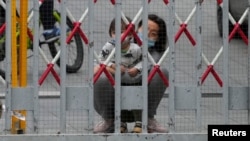Following China’s announcement that it would tighten restrictions in Shanghai to prevent the spread of COVID-19, the head of the World Health Organization on Tuesday said the country’s zero-tolerance policy is not sustainable.
Speaking at a media briefing Tuesday, Tedros Adhanom Ghebreyesus noted the behavior of the disease caused by the coronavirus and what experts "anticipate in the future.” He added, “We have discussed this issue with Chinese experts... I think a shift would be very important."
Authorities in Shanghai have tightened restrictions on its 26 million residents, despite a steady decline in new COVID-19 infections.
Residents in some neighborhoods have been informed in writing that they are not allowed to leave their homes or receive deliveries as part of a “quiet period” that would last for at least three days. The new restrictions caught residents by surprise, coming after a brief period of being allowed to move about their neighborhoods.
There have also been accounts posted on Chinese social media sites of residents being forcibly removed from their homes and placed in hotels or quarantine facilities if their neighbors tested positive for the coronavirus, as well as anecdotes of cleanup crews in full protective suits entering apartments to disinfect them.
A Shanghai city official confirmed the move in an interview with The Associated Press, saying the homes of people in older communities with shared bathrooms and kitchens will be disinfected.
The actions prompted open letters posted on social media Sunday by Tong Zhiwei, law professor at Shanghai’s East China University of Political Science and Law, and Liu Dali, a corporate lawyer in Shanghai, to question the legality of such practices.
Nearly all of Shanghai’s residents have been under strict orders for the past six weeks as officials in the Chinese financial hub struggle to contain a mass outbreak of new COVID-19 cases largely driven by a highly contagious omicron variant. The lockdown has led to angry complaints of a lack of fresh food and medicine throughout China’s biggest city.
Officials reported about 3,000 new cases Monday, far below a peak of 26,000 posted in mid-April.
Elsewhere in China, Beijing further tightened COVID-19 curbs on residents Monday with more mass testing and road closures as the country continues with its uncompromising battle with the virus.
Residents of the city’s worst-hit areas were told to work from home while more roads, compounds and parks were sealed off as the capital of 22 million grappled with its worst outbreak since 2020.
China has doubled down on its strict “zero-COVID” policy even as it severely disrupts everyday life and brings economic activity to a halt.
Some information for this report came from The Associated Press, Reuters, Agence France-Presse.
